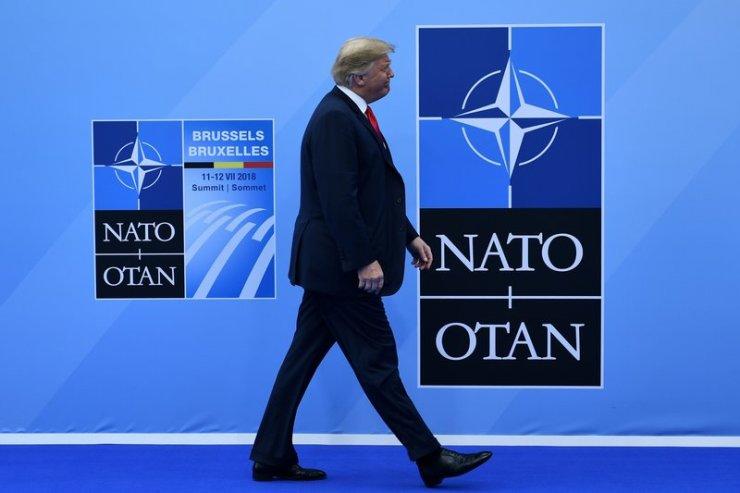President Trump has privately told senior administration officials that he wants to withdraw from NATO altogether, finds an explosive New York Times report:
Senior administration officials told The New York Times that several times over the course of 2018, Mr. Trump privately said he wanted to withdraw from the North Atlantic Treaty Organization. Current and former officials who support the alliance said they feared Mr. Trump could return to his threat as allied military spending continued to lag behind the goals the president had set.

Most of the remarks came surrounding last summer’s contentious NATO summit in Brussels, according to the Times. The 2-day meeting which concluded on July 12 was replete with Trump’s demanding that European countries pull their own weight on defense spending in the 29-nation trans-Atlantic alliance, including what was described at the time as a “vague threat” by the president that the US could actually exit the alliance if the imbalance continues. He told reporters at the time that NATO countries must radically increase defense spending or the US “will do our own thing.”
At the time Trump noted the Cold War era military alliance was a “drain on the United States” and that he “didn’t see the point” according to the Times report, citing current and former administration officials:
In the days around a tumultuous NATO summit meeting last summer, they said, Mr. Trump told his top national security officials that he did not see the point of the military alliance, which he presented as a drain on the United States. — New York Times
The Times report likens any potential US withdrawal “a move tantamount to destroying NATO” and perhaps to be expected, hypes NATO statements saying “Even discussing the idea of leaving NATO — let alone actually doing so — would be the gift of the century for Putin.” But the report expresses alarm that “Mr. Trump’s skepticism of NATO appears to be a core belief.”
Notably, the NYT report opens by suggesting that even mere discussion of a NATO pullout plays into Moscow’s hands, and further in the report cites an anonymous US official to make the unmeasurable or unprovable assertion that it would “accomplish all that Mr. Putin has been trying to put into motion.”
When asked for official comment the White House did not confirm or deny the Times report, only reaffirming that the US commitment to NATO remains “very strong” and the alliance “very important”.
But it appears the president’s private discussions with aides over the idea of the United States going its own way was no mere one-off conversation, according to the NYT:
When Mr. Trump first raised the possibility of leaving the alliance, senior administration officials were unsure if he was serious. He has returned to the idea several times, officials said increasing their worries.
The revelation, or we might say admin “leaks,” that Trump is giving it serious consideration comes after weeks of ‘deep state’ push back in the wake of Trump’s announced US “full” and “immediate” troop draw down in Syria.
The NYT suggests that like with the issue of Syria pullout, the question of NATO has opened up a quiet war between the president and his own advisers and generals: “just when officials think the issue of NATO membership has been settled, Mr. Trump again brings up his desire to leave the alliance,” according to the report.
During the reported height of Trump’s raising the issue with his staff ahead of last summer’s NATO summit in Brussels, his national security team “scrambled” to contain the president’s informal remarks and reign in such considerations, as according to the Times even merely verbalizing such potential plans would embolden Russia and sink NATO’s standing:
At the time, Mr. Trump’s national security team, including Jim Mattis, then the defense secretary, and John R. Bolton, the national security adviser, scrambled to keep American strategy on track without mention of a withdrawal that would drastically reduce Washington’s influence in Europe and could embolden Russia for decades.
And what remains is the following key and obvious question: is the Commander-In-Chief, who was elected by the American people, allowed to set the agenda and course of discussion over and against his generals and national security advisers or not?
After Syria, and possibly future or near term Afghan withdrawal, and now with the revelation that even the US role in NATO is under reevaluation in the president’s mind, the deep state revolt against Trump is only set to explode further in the open. No doubt, in the bowels of both the Pentagon and State Department it’s once again time for “damage control” – or so the thinking goes.
via RSS http://bit.ly/2RSa9Sn Tyler Durden